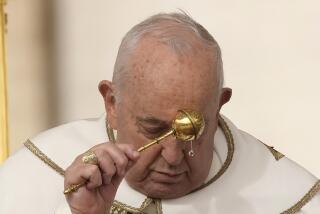Pontiff’s Message Condemns Destruction of Gulf War
VATICAN CITY — Pope John Paul II in his Easter message condemned the destruction in the Persian Gulf War and urged international leaders to erase a shadow over the world.
Standing on the balcony of St. Peter’s Basilica, the Pope addressed about 150,000 people in St. Peter’s Square and millions more on television. He called for rejoicing “in this day of light, strength and hope, which makes the darkness menacing the Earth recede.”
“Darkness which also recently has cast a shadow over the whole human community--when a choice was made of aggression and the violation of international law, when it was presumed to solve the tensions between the peoples by war, the sower of death,” he said.
“I address myself to you, the leaders of nations. Only upon an international order in which law and freedom are indivisible for all can the society we all hope for be founded,” the Polish-born pontiff said in his “Urbi et Orbi” (To the City and the World) message.
“You will vigorously prevent the exploitation of the poor. You will say no to the lucrative arms trade,” he said.
“Lend an ear, humanity of our time, to the long-ignored aspiration of oppressed peoples, such as the Palestinians, the Lebanese, the Kurds,” he said.
The Pope said that “from the Baltic to the Mediterranean and in other areas of the world, there rose in vain the voice of the peoples, yearning for respect for their own identity and their own history.”
The Pope also deplored “the inexorable threat of famine which has afflicted whole peoples in Africa” and “wars and guerrilla actions,” particularly in Angola, Mozambique, Liberia and Somalia.
While the Gulf War was on, the Pope repeatedly called for the international community to stop it. Since it ended, he has led moves aimed at a negotiated settlement of all Middle East problems.
U.S. troops in the Persian Gulf observed Easter as best they could. Some soldiers attended services and later participated in picnic-style athletic events.
In southern Iraq, U.S. Army Chaplain David Stricker stood on a bluff in the desert and helped lead an Easter service for warriors itching to go home. Standing between an American flag flapping in the wind and three wooden crosses propped up by sandbags, Stricker said: “Lord, grant us the gift of your spirit . . . that the time may pass quickly.”
Near Kuwait’s border with Iraq, Col. James Bluett, a chaplain for the 3rd Brigade of the 3rd Armored Division, conducted seven Masses in 24 hours for his troops.
The Easter service had just ended at Kuwait city’s only Roman Catholic church when allied soldiers on the coast detonated an Iraqi mine in a controlled explosion, rocking the church.
The congregation included a dozen American soldiers among the several hundred worshipers, mainly Filipinos and Indians.
“We should thank the Lord for granting to this region the gift of peace,” the priest said in his sermon. “Praise the Lord for helping us during the past months of captivity.”
At the Church of the Holy Sepulcher in Jerusalem, Roman Catholic Patriarch Michel Sabah said Mass for several hundred Arab Christians and small groups of Western pilgrims.
The Church of the Holy Sepulcher, built over the sites where tradition holds that Jesus was crucified and buried, is the focus of Easter Week celebrations.
Sabah, the first Arab to lead the Roman Catholic Church in the Holy Land, urged Israeli leaders to come to terms with the 1.7 million Palestinians in the occupied West Bank and Gaza Strip, who have waged a 40-month uprising against Israeli rule.
The Greek Catholic Patriarch of Jerusalem, Lutfi Laham, also appealed for peace. “Our people are looking for a genuine Easter so that our country can rejoice in peace and happiness,” he said.
Easter Sunday was a double blessing for Albanians. They were free to celebrate for the first time since 1967. And they also held their first free elections after almost five decades of Communist rule.
For the first time in 30 years, Cuba’s state radio broadcast an Easter religious service, the latest signal of increasing tolerance by Communist authorities toward Christian worship and teaching.
The service at the Vedado Methodist Church in Havana was held by Cuba’s Ecumenical Council, which groups all the Christian denominations on the island except the biggest, the Roman Catholics. Cuban Catholics did not participate in the program but held their own services across the island.
Cuban Methodist Bishop Joel Ayo’s sermon expressed gratitude to the Communist government for allowing the broadcast.
In officially atheist China, 3,000 people attended Latin Mass at Beijing’s Cathedral of Immaculate Conception of the Blessed Virgin Mary, popularly known as “the South Church.” Many of those who attended said they had turned to religion because they were disillusioned with politics.
Thousands of mourners in Belfast, Ireland, attended the Easter Sunday funeral of two teen-age girls and a man in his 20s, shot to death last week by a Protestant gunman.
Father Tom McGuinness told weeping mourners: “I would ask the ordinary people of Northern Ireland to spew out the men and women of violence.” He described violence that has cost almost 3,000 lives in Northern Ireland since 1969 as “this cancer in our society.”
In Dublin, Ireland, President Mary Robinson led ceremonies marking the 75th anniversary of the Easter Rising, a rebellion against British rule. Prime Minister Charles Haughey also attended the low-key military ceremony.
The uprising of 1916 left 450 people dead and 2,600 wounded. Most of central Dublin was reduced to rubble by the British military.
More to Read
Sign up for Essential California
The most important California stories and recommendations in your inbox every morning.
You may occasionally receive promotional content from the Los Angeles Times.










